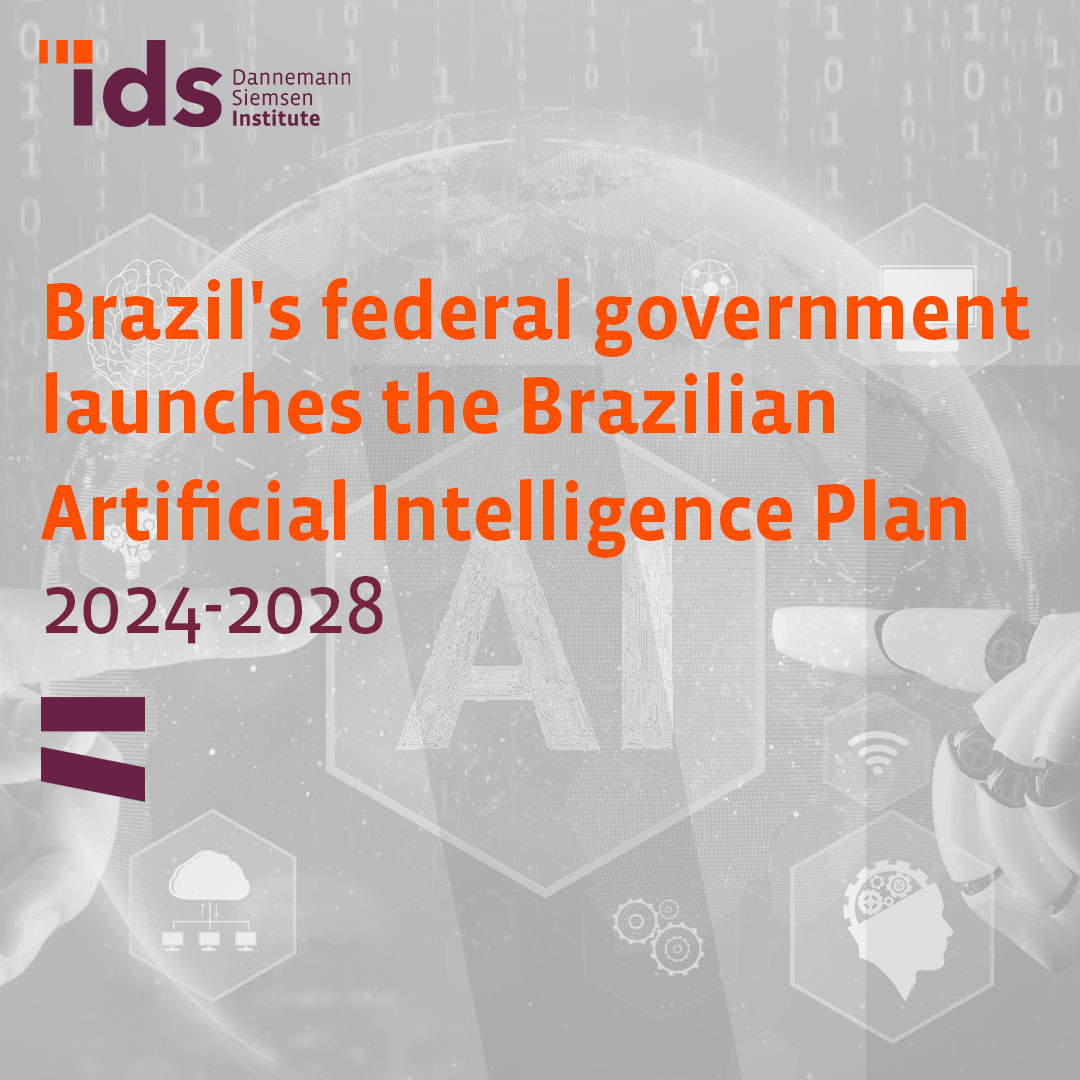15 de agosto de 2024
Share
Brazil’s federal government launches the Brazilian Artificial Intelligence Plan 2024-2028
On 30 July, the federal government presented the Brazilian Artificial Intelligence Plan (PBIA) 2024-2028, a project that aims to position Brazil as a global leader in artificial intelligence (AI) technology. The plan, dubbed “AI for the Good of All”, was developed in collaboration with the private sector and other institutions to establish goals and guidelines for the development and application of AI in various areas, including health, education, public security and energy. Investment in the project will come from the private sector, the National Fund for Scientific and Technological Development (FNDCT), the Financier of Studies and Projects (Finep), linked to the Ministry of Science, Technology and Innovation (MCTI), and the National Bank for Economic and Social Development (BNDES).
The PBIA is divided into 10 premises and aims, through AI, to modernise the public services offered to the population, introducing technological innovations that can improve their efficiency and quality. The plan has also been structured into two major phases of operation, the so-called “Immediate Impact Actions” and the “Structuring Actions”. Thus, the main focus of investment will be on Immediate Impact Actions, i.e. 31 initiatives that are already underway or will be launched in the short term to solve specific problems in priority areas such as health, agriculture, the environment, industry, trade and services, education, social development and public service management.
In the health sector, for example, the plan proposes the use of autonomous disinfection systems for hospital environments, as well as technologies that facilitate the transcription of tele-consultations directly into electronic medical records, ensuring greater precision and security in the recording of patient information. In the educational field, the PBIA includes initiatives such as the use of AI to personalise teaching and improve student learning, especially in subjects such as mathematics, where technology can help identify specific difficulties and propose individualised solutions, as well as the use of AI as a management tool for controlling student attendance, with a view to tackling school drop-outs.
Another objective of the PBIA, established in the “Structuring Actions” phase, is the development of the so-called Santos Dummont supercomputer, which the government intends to make one of the five most powerful in the world. The machine should be able to process large volumes of data and carry out complex simulations. The plan also emphasises the need for a robust and sustainable energy infrastructure to support the increase in energy consumption associated with the intensive use of AI. To this end, the PBIA provides for investment in renewable energy sources, such as hydroelectric plants and other clean technologies, to ensure that technological development does not jeopardise the environment.
Furthermore, the PBIA also aims, in the axis called “Dissemination, Training and Capacity Building”, to include actions to train and retrain professionals in AI, with an emphasis on including historically marginalised groups, ensuring that the benefits of the technology are widely shared. Thus, the plan proposes initiatives such as public-private partnerships for AI training projects, AI scholarships for undergraduate and postgraduate studies, information campaigns on the critical use of AI and the qualification of AI workers.
The PBIA is also committed to ensuring that the use of AI is ethical and responsible, protecting the privacy and rights of citizens. In this sense, the plan proposes the creation of a national “sovereign cloud” to store and protect sensitive data, preventing the misuse of personal information by companies and other organisations. Furthermore, the axis of the plan called “AI for business innovation” aims to structure a robust AI value chain in Brazil, through actions such as the development of national data centres, support for AI start-ups and the creation of a National Centre for AI applied to agriculture and livestock.
Finally, the last axis deals with support for the AI regulatory and governance process. Here, the aim is to commit to consolidating an AI governance framework that promotes innovation, ensures the right to development, protects human rights, information integrity and copyright and related rights. To this end, actions are proposed such as the publication of a series of Brazilian guides to responsible AI, the creation of a National Centre for Algorithmic Transparency and Trustworthy AI and a Brazilian AI Observatory, the expansion of international partnerships, active participation in global forums and the sharing of good practices with other nations.
The plan can be accessed via the link: Plano Brasileiro de Inteligência Artificial (PBIA) 2024-2028
Note: For quick release, this English version is provided by automated translation without human review.
